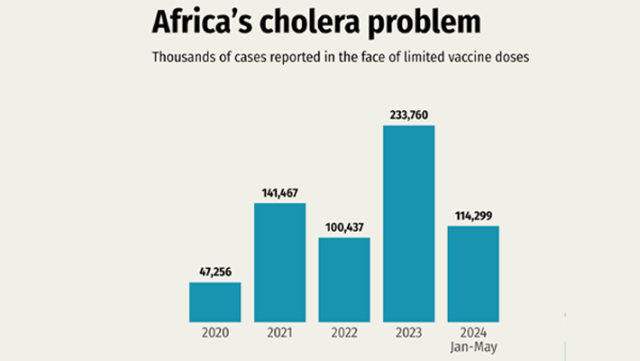ABUJA,Nigeria (NAN)-The federal government has launched the National Strategic Plan of Action on Cholera Control 2025-2029, a $124 million initiative aimed at eradicating cholera in Nigeria through a multi-sectoral approach.
The plan was unveiled on Tuesday in Abuja by Muhammad Pate, the Coordinating Minister of Health and Social Welfare, who emphasised the government’s commitment to cholera prevention, preparedness, and response.
The launch event, hosted in partnership with the Nigeria Centre for Disease Control and Prevention (NCDC), the National Primary Health Care Development Agency (NPHCDA), and international health partners, marked a significant milestone in Nigeria’s efforts to combat cholera and safeguard public health.
Pate, represented by the Permanent Secretary of the Ministry, Daju Kachallom, highlighted the urgent need for a coordinated response to combat frequent outbreaks across the country.
He said, “The Ministry of Health is working closely with other ministries and partners to implement this plan. The plan is built on key pillars such as leadership and coordination, surveillance, case management, cholera vaccination, water, sanitation, and hygiene (WASH), as well as public awareness and research.’’
Pate stressed that eliminating cholera in Nigeria required collaboration among government agencies, development partners, private sector actors, and local communities.
He stated, “Cholera has been eradicated in other parts of the world; why is it still affecting Nigeria? We must act collectively to change this reality.’’
He urged stakeholders to commit to the plan’s implementation and ensure that the country builds resilient health and sanitation systems to prevent future outbreaks.
The Director-General of the Nigeria Centre for Disease Control and Prevention (NCDC), Jide Idris, noted that the NSPACC, led by the ministries of health, water resources, sanitation, and environment, aligned with the Global Task Force on Cholera Control and the Global Roadmap to Ending Cholera.
He emphasised that the plan aligned with the Global Task Force on Cholera Control and the Global Roadmap to Ending Cholera.
He pointed out that the plan identified 134 hotspot local government areas (LGAs) across 21 states, which accounted for 71.1 per cent of cholera cases and 65.6 per cent of deaths, in spite of representing only 17.7 per cent of Nigeria’s population.
He said the key interventions under the plan include scaling up oral cholera vaccine coverage, improving WASH infrastructure, strengthening epidemiological surveillance, enhancing laboratory capacity, and running public awareness campaigns on cholera prevention.
Idris said the five-year plan required $124 million, with an annual budget of $20 million, primarily allocated to WASH initiatives, followed by OCV programmes and laboratory services.
The Minister of Water Resources and Sanitation, Joseph Utsev, represented by Permanent Secretary, Richard Pheelangwah, reaffirmed the ministry’s commitment to expanding access to safe drinking water and improving sanitation to prevent cholera outbreaks.
The Minister of Environment, Balarabe Lawal, represented by Mahmud Kambari, emphasised the role of environmental health efforts in disease prevention, highlighting ongoing initiatives such as national sanitation programmes and environmental health surveillance.
The Global Task Force on Cholera Control launched “Ending Cholera: A Global Roadmap to 2030,” aiming to reduce global cholera deaths by 90 per cent and eliminate the disease in at least 20 countries by 2030.
In response, Nigeria developed NSPACC to accelerate cholera control by 2029 through prevention, timely detection, and a multi-sectoral approach.
Following Nigeria’s commitment at the 71st and 75th World Health Assembly, the Office of the Vice President was designated to coordinate the NSPACC and oversee the National Cholera Steering Committee.
The plan aims to reduce annual cholera incidence and deaths by 90 per cent and lower the case fatality rate to below 1 per cent by 2029.
Developed through multi-stakeholder consultations, the NSPACC was finalised through workshops held in 2022 and 2023.
A validation workshop in June 2023 finalised the plan, which was then endorsed by the GTFCC partnership.
Structured around nine thematic pillars, the NSPACC focuses on leadership & coordination, surveillance, laboratory strengthening, case management, OCV, WASH, risk communication & community engagement, logistics, and research.
Stakeholders emphasised that this launch reinforces Nigeria’s commitment to cholera elimination through a coordinated, evidence-based, and well-funded approach.




















